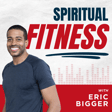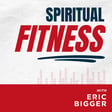
118. Holistic Health for Women Over 40: Managing Hormonal Imbalances, Nutrition, and Self-Love with Josephine Gorchoff
In this episode of the Spiritual Fitness podcast, Eric Bigger welcomes fitness trainer and nutritionist Josephine Gorchoff to discuss holistic health for women over 40. Josephine shares insights on managing hormonal imbalances, dietary recommendations, and the importance of self-love in achieving wellness. She emphasizes the integration of physical fitness, proper nutrition, mindset, and spiritual practices. Josephine provides practical tips for maintaining energy, emotional stability, and achieving healthy weight loss.
Perfect for those seeking to align their spiritual and physical well-being, this episode offers expert guidance on living a vibrant, purposeful life.
Contact Josephine: www.fitnessbyjojo.com
Instagram:@Weightlossbyjojo
Also in this episode:
- Josephine outlines the four phases—Ovulation, Follicular, Menstruation, and Luteal—and their impact on mood, energy, and cravings.
- Focus on whole, minimally processed foods, healthy fats, and stable blood sugar levels to reduce inflammation, particularly for women in perimenopause and menopause.
- Positive thinking and self-respect play crucial roles in achieving health goals. Self-love should be prioritized to maintain consistent and holistic health.
- Strategies for incorporating balanced meals and regular exercise into a hectic schedule, emphasizing the importance of self-care.
About Josephine:
Josephine has been a personal trainer and nutritionist in LA for over a decade she has worked with celebrities,and game show hosts to studio executives. Her focus is on perimenopausal and menopausal women over 40.
In her Fit Over 40 Formula she helps professional women over 40 lose 1-2 dress sizes, burn belly fat, boost energy, and fit in their old clothes again through her holistic lifestyle program that focuses on body, mind and soul.
Check out Miracle Season’s collection: https://itsmiracleseason.co/collections/frontpage
Work with me: https://www.ericbigger.com/workwithme?utm_source=podcast&utm_medium=podcast&utm_campaign=work_with_m...
Connect with Simplified Impact: https://hubs.ly/Q02vvMJ90

